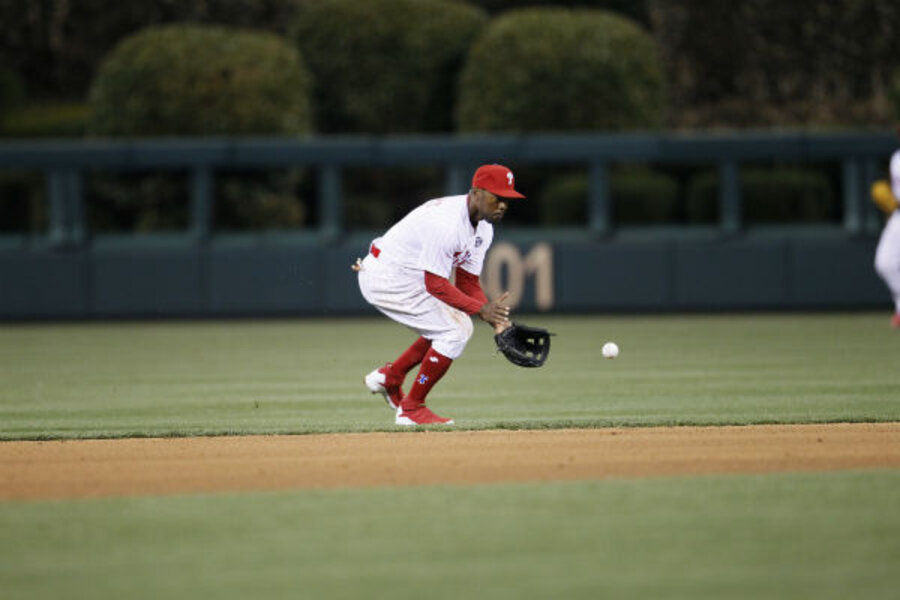Is paternity leave for pro sports ready for an upgrade?
Loading...
Tony Perez was on the road with the Cincinnati Reds in 1966 when he got the call that his first child was on the way. There was no discussion about leaving the team to attend Victor's birth, no such thing as paternity leave.
"They didn't give you any time off when I was playing," the Hall of Fame slugger said, recalling that he got the news about noon before going to the ballpark. "We played that night. We got a day off in Chicago the next day and I flew home on my own."
These days, more pro athletes are taking time off to be with their families in the delivery room. Yet Major League Baseball remains the only one of the four major professional leagues in North America to have a standardized paternity leave policy. The NFL, NBA, and NHL leave the matter up to individual players and their teams.
"There is stress on both sides," said Phillies manager Ryne Sandberg, who watched shortstop Jimmy Rollins miss a game against Texas this season to fly home to be there for the birth of his second child. "Job stress and stress from the family side. So I think this being in place takes care of that, just makes it's a done deal for the player, and the team deals with it. It takes the pressure off the player."
New York Mets second baseman Daniel Murphy was criticized on sports talk radio this month for taking three days, which is provided for in baseball's rules, to spend time with his wife and newborn son Noah. But in the days that followed, Murphy received wide support from players and coaches who say the times have changed.
"That's a negotiated right that is a win for everybody," said Marlins infielder Ed Lucas, who missed one game last September for the birth of his son. "It shows compassion on the side of the team. It's the only major sport that has paternity leave. But we're also the only sport that plays every day."
Players in the NFL, NBA, and NHL all have several off days a week in most cases and rosters stocked with extra players, giving the teams and the athletes the freedom to work on a case-by-case basis. In baseball, a three-day absence usually means three games missed, so the burden on the team, and the potential guilt felt by the player, is much higher.
"I think, traditionally speaking, I think some guys were afraid to ask," Pirates manager Clint Hurdle said. "So many guys didn't want to ask because of job security. It was almost like a standard way of doing it that you didn't leave."
Baseball's general managers and the players' union recognized this trend a few years ago. At the GM meetings in 2011, a rule was drafted to allow a team to place a player on the paternity leave list for three days and call up a replacement from the minor leagues.
"When you have a policy, it just makes it easier for clubs and players," said Dan Halem, MLB's executive vice president for labor relations who helped draft the policy. "Everybody knows what the rules are and it's automatic. You place the player on the list and he goes and everybody knows when he's coming back."
Mr. Halem said the measure received universal support among owners and union leaders. In the first three years of the policy, 73 players were placed on the list.
NASCAR recently made changes to be more accommodating. Until this season, a driver could not miss a race without giving up the chance to win a championship. This year, under the new format, a driver can miss a race and still make the Chase for the Spring Cup championship. Matt Kenseth and Paul Menard had standby drivers this season, with their wives due to give birth.
Both said they were willing to miss a race, if needed. Neither had to because both women gave birth on weekdays.
It doesn't always go so smoothly. In 1993, Houston Oilers offensive line coach Bob Young said right tackle David Williams "let the guys down, and he let hundreds of thousands of fans down" when he chose to miss a game against New England to stay by his wife's side while she gave birth to their son.
In Murphy's case, sports talk radio hosts Mike Francesa and Boomer Esiason questioned him for missing two games at the start of this season.
"One day I understand. And in the old days they didn't do that," Francesa said. "But one day, go see the baby be born and come back. You're a Major League Baseball player. You can hire a nurse to take care of the baby if your wife needs help."
Esiason quickly apologized after a host of athletes, coaches, and family groups came to Murphy's defense. Rollins, Dodgers outfielder Carl Crawford, and Twins reliever Brian Duensing have missed games already this year for child birth. Minnesota Vikings star running back Adrian Peterson missed three days of training camp in 2011 for the birth of his son. Little attention was paid to any of those absences.
Then there is Oakland reliever Dan Otero, who missed one game while attending the birth of daughter Kinsley in September. Did he get any grief?
"Not at all," Otero said. "They were mad at me I came back early."
___
AP Motor Sports Writer Jenna Fryer, AP Sports Writers Steven Wine in Miami, Janie McCauley in Oakland, Calif., Jimmy Golen in Boston, Stephen Hawkins in Texas and Will Graves in Pittsburgh and AP freelance writer Ken Dunleavy in Washington contributed to this report.







